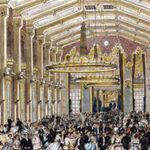Fisher Center
2014 Bard Music Festival Gala Dinner
April 9, 2014
Fisher Center
April 9, 2014


Wednesday, April 9, 2014
7 pm Cocktails and Dance Instruction
8 pm Dinner and Dancing
James Burden Mansion
7 East 91st Street, New York City
Tables of Ten
Benefactor $15,000 (tax-deductible portion $13,600)
Tables of Eight
Patrons $10,000 (tax-deductible portion $8,880)
Sponsor $5,000 (tax-deductible portion $3,880)
Individual Tickets
Donor $1,000 (tax-deductible portion $860)
Associate $500 (tax-deductible portion $360)
The Bard Music Festival was founded in 1990 to promote new ways of understanding and presenting the history of music to a contemporary audience. Each year, a single composer is chosen as the main subject. The festival explores his biography, considers his influences and the consequences of his achievement, and examines all aspects of the musical culture surrounding the time and place of his life.
The 25th Bard Music Festival will explore the world of Franz Schubert (1797–1828), one of the preeminent composers in the Western tradition and yet a figure who in many ways remains elusive. This year—2014—is a fitting one to honor Schubert: it is the bicentennial of his first masterpiece, the setting of Goethe’s Gretchen am Spinnrade, composed on October 19, 1814, a date often called the “birthday of the German Lied.”
One reason for the unusual unfolding of Schubert’s legacy was his early death at age 31. At that time he was best known for his songs and keyboard music, but his larger ambitions and accomplishments were much less appreciated, especially beyond Vienna, and even close friends were unaware of the full scope of his compositional achievement. Over the course of the next three quarters of a century much of Schubert’s greatest music was gradually released to an astonished public: all of his symphonies, his late string quartets and string quintet, the three final piano sonatas, as well as hundreds of songs, dances, keyboard and religious works, and even full-scale operas.
The Bard Music Festival will concentrate on how Schubert was known in his own time and as he came to be understood by posterity. His active career occurred in an era of censorship and political reaction, amid massive economic and technological change. Schubert’s contemporaries were Beethoven, Rossini, Weber, and Paganini, but they also included many amateur and professional composers. The festival will examine the Biedermeier-era world of music in the home and its newly founded music societies and choral associations. The unique comic theater of Vienna, the city’s literary landscape, and the consequences of the politics of reaction under Metternich all frame the context for this major reappraisal of Schubert. The festival will end with a performance of Fierrabras, an opera that, like so many works Schubert wrote for the stage, failed to be produced during his lifetime.
Proceeds from this evening will support the artistry and continuing presentation of the Bard Music Festival.